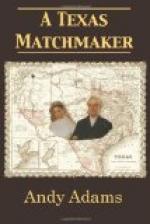During this visit a new avenue in life opened before
me, and through the influence of my eldest brother
I secured a situation with a drover and followed the
cattle trail until the occupation became a lost one.
My last visit to Las Palomas was during the winter
of 1894-95. It lacked but a few months of twenty
years since my advent in the Nueces valley. After
the death of Oxenford by small-pox, I had been a frequent
visitor at the ranch, business of one nature and another
calling me there. But in this last visit, the
wonderful changes which two decades had wrought in
the country visibly impressed me, and I detected a
note of decay in the old ranch. A railroad had
been built, passing within ten miles of the western
boundary line of the Ganso grant. The Las Palomas
range had been fenced, several large tracts of land
being added after my severing active connections with
the ranch. Even the cattle, in spite of all the
efforts made for their improvement, were not so good
as in the old days of the open range, or before there
was a strand of wire between the Nueces and Rio Grande
rivers. But the alterations in the country were
nothing compared to the changes in my old master and
mistress. Uncle Lance was nearing his eighty-second
birthday, physically feeble, but mentally as active
as the first morning of our long acquaintance.
Miss Jean, over twenty years the junior of the ranchero,
had mellowed into a ripeness consistent with her days,
and in all my aimless wanderings I never saw a brother
and sister of their ages more devoted to, or dependent
on each other.
On the occasion of this past visit, I was in the employ
of a live-stock commission firm. A member of
our house expected to attend the cattle convention
at Forth Worth in the near future, and I had been sent
into the range sections to note the conditions of
stock and solicit for my employers. The spring
before, our firm had placed sixty thousand cattle
for customers. Demand continued, and the house
had inquiry sufficient to justify them in sending
me out to secure, of all ages, not less than a hundred
thousand steer cattle. And thus once more I found
myself a guest of Las Palomos.
“Don’t talk cattle to me,” said
Uncle Lance, when I mentioned my business; “go
to June—he’ll give you the ages and
numbers. And whatever you do, Tom, don’t
oversell us, for wire fences have cut us off, until
it seems like old friends don’t want to neighbor
any more. In the days of the open range, I used
to sell every hoof I had a chance to, but since then
things have changed. Why, only last year a jury
indicted a young man below here on the river for mavericking
a yearling, and sent him to Huntsville for five years.
That’s a fair sample of these modern days.
There isn’t a cowman in Texas to-day who amounts
to a pinch of snuff, but got his start the same way,
but if a poor fellow looks out of the corner of his
eye now at a critter, they imagine he wants to steal
it. Oh, I know them; and the bigger rustlers they
were themselves on the open range, the bitterer their
persecution of the man who follows their example.”




